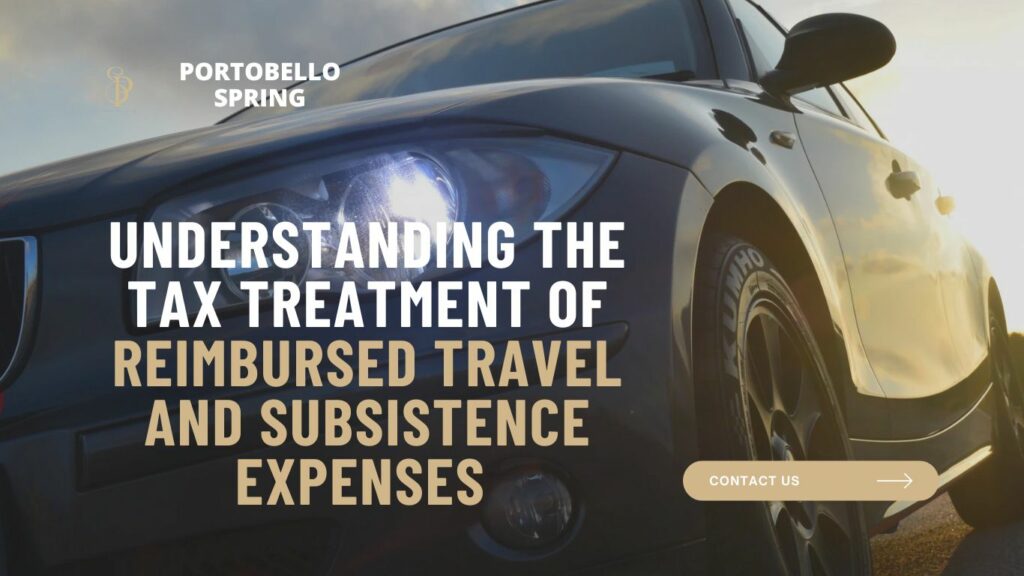Understanding Tax-Free Reimbursements
In the realm of taxation compliance, understanding the intricate details of how travel and subsistence expenses are treated is essential for both employers and employees. This blog aims to provide a comprehensive overview of the tax treatment of reimbursed expenses for office holders and employees in Ireland. Whether you’re a business owner seeking clarity on your obligations or an employee looking to understand your entitlements, this guide will help you navigate the complexities of tax regulations.

Reimbursement Scenarios: An Overview
When it comes to travel and subsistence expenses, two primary scenarios generally arise:
- Non-Reimbursement by Employer: In this scenario, the employer does not reimburse the employee for travel and subsistence expenses. However, the employee can claim a tax deduction for these expenses if they were necessarily incurred during the performance of their duties. It’s important to note that employees cannot apply the civil service rates of travel and subsistence to themselves. Claims must be made after the end of the tax year, using the appropriate forms available on the Revenue website.
- Reimbursement by Employer: Here, the employer reimburses the employee for the expenses incurred. The key concern is whether these reimbursements can be made tax-free. This blog delves into the conditions under which such reimbursements are exempt from tax.
Tax-Free Reimbursements: The Criteria
The reimbursement of travel and subsistence expenses can be made tax-free under certain conditions. The general principle is that these expenses must be necessarily incurred in the performance of the employee’s duties. A fundamental rule in tax case law is that commuting expenses from home to work and back are not considered necessary for the performance of duties. As such, any reimbursement for these commuting expenses is taxable and subject to PAYE deductions.
It’s also important to recognize the distinction between office holders and regular employees. An office holder is someone who holds a permanent, substantive position, which exists independently of the person occupying it. Examples include positions created by statute or regulation. The remuneration of office holders is subject to tax under the PAYE system.
Understanding Tax-Free Reimbursements
Mislabeling Remuneration as Expenses
One crucial aspect of tax compliance is ensuring that remuneration is not incorrectly labeled as tax-free expenses. If Revenue discovers that remuneration has been misclassified as expenses, they may investigate for potential fraud or neglect, and could take appropriate action, including penalties.
Record-Keeping Requirements
For employers, maintaining accurate records of reimbursed expenses is essential. When using an acceptable flat-rate allowance for reimbursement, the following details must be recorded:
- Name and address of the employee or director
- Date and purpose of the journey
- Kilometres traveled
- Starting point, destination, and finishing point
- Basis for the reimbursement (e.g., overnight stay away from the normal place of work)
If expenses are vouched by receipts, these receipts must be retained alongside details of the expenses incurred. Employers are required to keep these records for six years after the tax year they pertain to.
Understanding Tax-Free Reimbursements
Enhanced Reporting Requirements (ERR)
From January 1, 2024, enhanced reporting requirements came into effect under Section 897C of the Taxes Consolidation Act 1997. Employers are now mandated to report certain benefits, including tax-free travel and subsistence expense payments. This new requirement is part of a broader effort to ensure transparency and compliance in the reporting of employee benefits.
Employers should familiarize themselves with the details outlined in Tax and Duty Manual Part 38-03-33 to ensure they meet these reporting obligations.
Conclusion
Navigating the tax treatment of reimbursed travel and subsistence expenses requires a clear understanding of the rules and careful adherence to record-keeping and reporting requirements. For businesses and individuals alike, staying informed about these regulations is crucial to ensuring compliance and avoiding potential penalties.
If you need further guidance or have specific circumstances not covered in this blog, consulting with a tax professional or seeking advice from Revenue can provide the clarity needed to handle these matters effectively.
Staying compliant with tax laws is not just about fulfilling obligations; it’s about ensuring the smooth operation of your business and the financial well-being of your employees.
Disclaimer:
The information in this blog post is intended for general informational purposes only and should not be construed as professional advice. It is your responsibility to seek professional advice tailored to your specific situation.
Let us help you make the right moves for your business by contacting and joining us
Join our newsletter now and get insights on the latest developments going on in the accounting, tax, incorporation, immigration and company secretarial world. Or, contact us by writing in your query in the contact form given below.

Leave a Reply